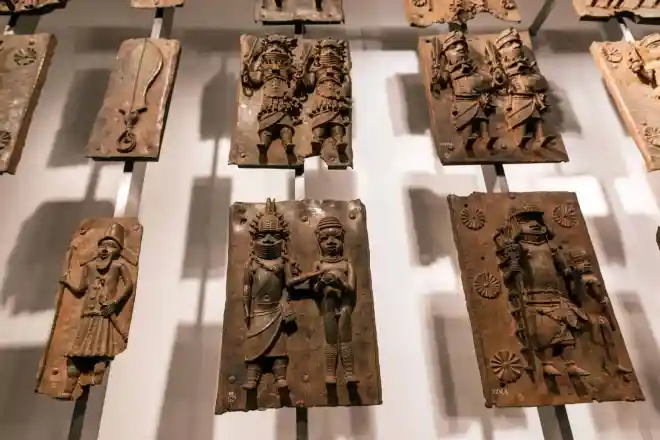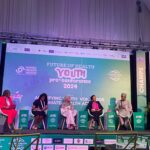In recent years, the issue of repatriating looted African artifacts, particularly the Nigerian bronzes, has gained significant global attention. These ancient, culturally rich artifacts, largely taken from the Benin Kingdom during British colonial rule in the 19th century, remain symbols of a painful history of colonial exploitation.
The restitution of these bronzes is not only a matter of righting historical wrongs but also a way to revive Nigeria’s cultural heritage and identity. This journey, however, has been fraught with obstacles and slow progress. Here, we examine the trajectory of these efforts, the challenges faced, and the promises of restoration and cultural renaissance that accompany the return of these bronzes to Nigeria.
The Nigerian bronzes, also known as the Benin Bronzes, were taken during the British punitive expedition of 1897. At the time, British forces stormed Benin City, the capital of the Kingdom of Benin, in present-day Edo State, Nigeria.
After a violent encounter, the British sacked the royal palace and looted thousands of bronze and ivory artifacts crafted by local artisans. These bronzes, which include busts, plaques, and figurines, captured the sophisticated artistry, spiritual beliefs, and social life of the Benin Kingdom.
For over a century, these artifacts have been housed in museums and private collections across Europe and North America, with notable collections in the British Museum in London, the Ethnological Museum of Berlin, and the Quai Branly Museum in Paris.
The campaign for restitution of African artifacts gained momentum in the 20th century, but the Nigerian government’s calls for the return of the Benin Bronzes took on greater urgency in recent decades. In the 1970s, Nigeria made formal requests to Britain and other nations to return looted artifacts.
However, legal battles and complex negotiations limited progress. European museums cited various reasons for delay, including legal ownership issues, fears of setting precedent for large-scale restitutions, and concerns over the bronzes’ preservation.
The repatriation momentum intensified in 2018 when French President Emmanuel Macron committed to returning African artifacts from French museums, following the release of the Sarr-Savoy report, which advocated for the large-scale return of African heritage items. This report inspired renewed conversations around artifact restitution and strengthened the position of African nations in negotiations with museums.
The Nigerian government took significant steps to facilitate the return of these bronzes. The establishment of the Legacy Restoration Trust and plans for a new Edo Museum of West African Art (EMOWAA) in Benin City have bolstered Nigeria’s case for restitution.
The EMOWAA project, a collaborative effort with the British Museum, is intended to be a cultural hub where returned bronzes and other artifacts can be exhibited, preserved, and appreciated.
Notably, in 2021 and 2022, several institutions began to return artifacts to Nigeria. The University of Aberdeen, the Ethnological Museum of Berlin, and the Horniman Museum in London were among the first to repatriate Benin Bronzes.
In October 2022, the Smithsonian’s National Museum of African Art in Washington, D.C., also returned several bronzes. These returns, though limited, have set a precedent for other institutions housing looted artifacts.
Challenges
Despite the positive developments, the restitution process remains hampered by several obstacles. Legal constraints and bureaucratic red tape have prolonged negotiations, with some institutions citing that legal ownership, rather than ethical considerations, guides their actions.
The British Museum, which houses the largest collection of Benin Bronzes, has been particularly resistant to restitution efforts. The museum argues that it is legally restricted from deaccessioning objects due to British laws that protect its collections. Although some British politicians and cultural leaders advocate for changing these laws, progress has been slow.
Another challenge is ensuring the safety and preservation of the returned bronzes. Concerns have been raised about Nigeria’s capacity to safeguard these invaluable artifacts. Initiatives such as the EMOWAA and local museum development have helped mitigate these concerns, but the international community is closely watching to see if Nigeria can provide adequate facilities for these artifacts upon their return.
The journey of restitution represents a hopeful step towards justice for Nigeria. The return of looted bronzes signifies an acknowledgment of historical wrongdoing and an effort to restore the cultural legacy of the Benin Kingdom. While many artifacts are yet to be returned, those that have been repatriated serve as powerful symbols of resilience and pride for Nigeria.
The restitution of the bronzes offers Nigeria a unique opportunity to rebuild cultural heritage and foster historical understanding. Artifacts, after all, are more than just objects; they hold stories and serve as reminders of a rich history that predates colonialism. For young Nigerians, the return of these bronzes can bridge a generational gap, offering them a tangible connection to their past.
While the journey is far from complete, each returned artifact reinforces the significance of cultural sovereignty and identity for Nigeria and other African nations. The return of the Benin Bronzes represents a beacon of hope, a testament to resilience, and a reminder that even after decades of injustice, there remains a path toward restoration and cultural pride.
The issue of repatriating Nigerian bronzes, taken during the British colonial rule in the 19th century, has gained global attention as a step towards righting historical wrongs and reviving Nigeria’s cultural heritage. These artifacts are central to the cultural identity of Nigeria, having been looted in the 1897 British expedition against the Kingdom of Benin. Efforts to restitute these bronzes accelerated with the formation of the Benin Dialogue Group in 2007 and gained further momentum when the Sarr-Savoy report of 2018 advocated for the return of African heritage items. Repatriation has begun with some institutions like German museums and the Smithsonian in Washington, D.C., returning bronzes.
However, the restitution process faces challenges. Legal and bureaucratic hurdles, especially from institutions like the British Museum, slow down negotiations, citing legal restrictions that prevent deaccessioning. Additionally, concerns about Nigeria's ability to preserve these artifacts are being addressed through initiatives like the planned Edo Museum of West African Art. Despite these challenges, the return of bronzes is a pivotal moment for Nigeria, symbolizing resilience and a reclaiming of cultural sovereignty. It offers an opportunity for Nigerians to reconnect with their past and underscores the importance of cultural justice globally.






